Search results for: “heat”
-
Adiabatic flame temperature: hydrogen, methane and oil products?
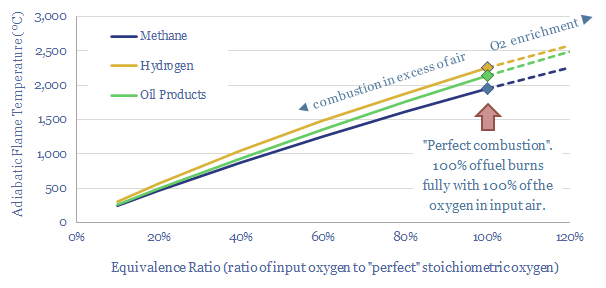
At an idealized, 100% stoichiometric ratio, the adiabatic flame temperature for natural gas is 1,960ºC, hydrogen burns 300ºC hotter at 2,250ºC and oil products burn somewhere in between, at around 2,150ºC. The calculations show why hydrogen cannot always be dropped into an existing turbine or heat engine.
-
Global energy demand by end use?
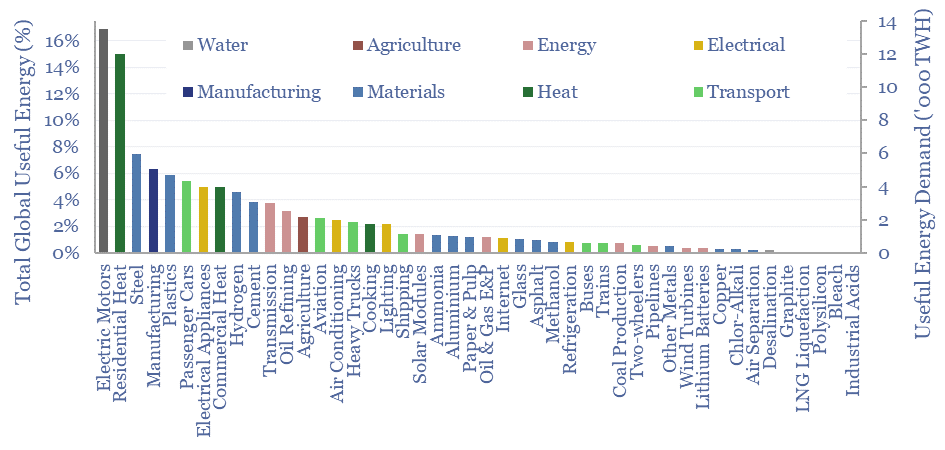
This data-file is a breakdown of global energy demand by end use, drawing across our entire research library, to disaggregate the global energy system across almost 50 applications, across transportation, heat, electricity, materials and manufacturing. Numbers, calculations, efficiencies and heating temperatures are in the data-file.
-
LNG liquefaction technologies: an overview?
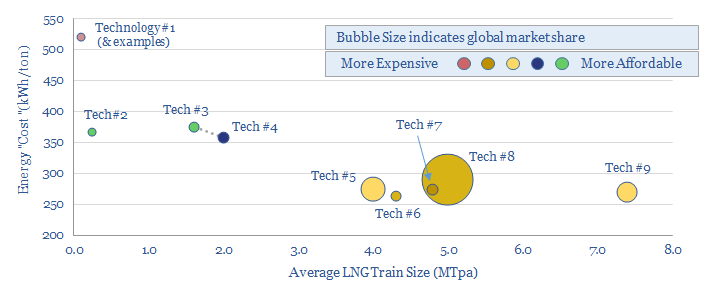
This data-file is an overview of different LNG liquefaction technologies: APCI, APX, Optimised Cascade, Fluid Cascade, DMR, SMR, PRICO and MMLS. A typical LNG liquefaction plant has energy intensity of 280kWh/ton, consuming 5% of the input gas entering the plant, with 20kg/boe of Scope 1&2 CO2 intensity. But efficient and electric-drive compression can lower these…
-
Organic Rankine Cycles: the energy economics?
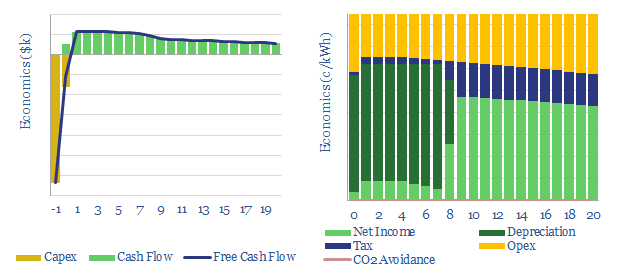
This data-file captures the energy economics of an Organic Rankine Cycle to recover low-grade waste heat (at 70-200C) from an industrial facility, or in the geothermal industry. A CO2 price of $50-75/ton could greatly accelerate adoption and improve the efficiency of industrial facilities.
-
Absorption chillers: the economics?
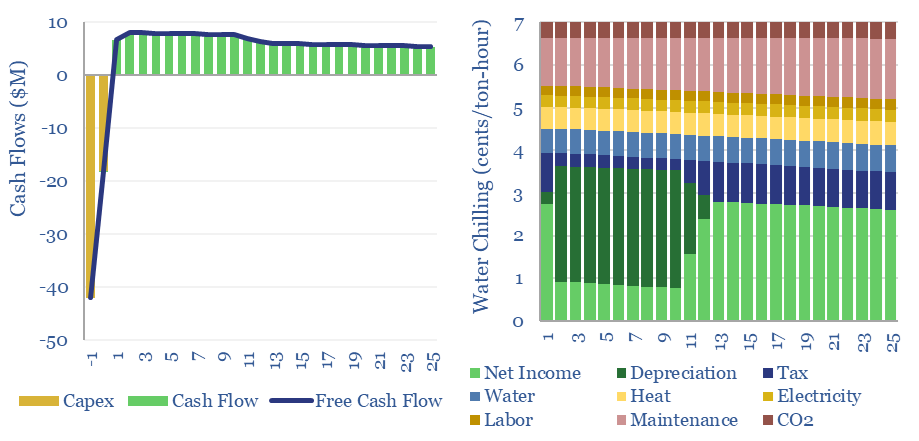
Absorption chillers perform the thermodynamic alchemy of converting waste heat into coolness. Capex costs of absorption chillers average $600/kW-th and all-in absorption chiller costs run to 6-7 cents/ton-hour, depending on the price of incoming waste heat. This data-file captures the economics of absorption chillers from first principles.
-
Thermal energy storage: leading companies?
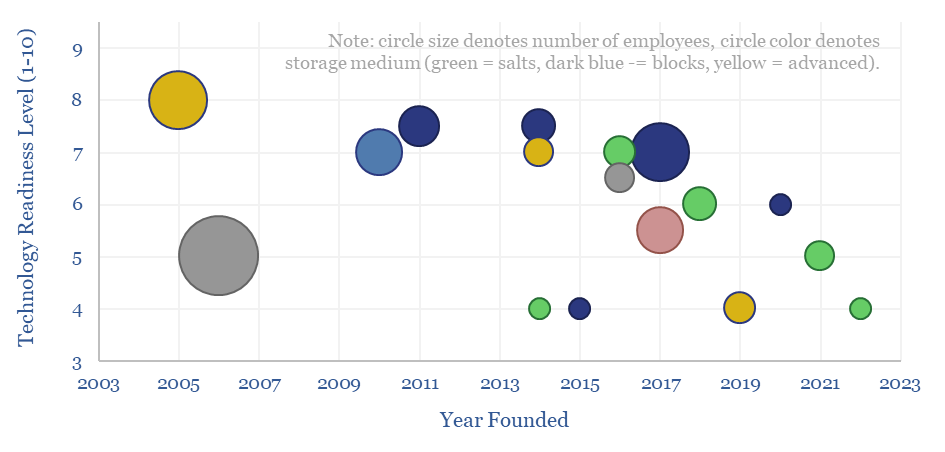
This data-file is a screen of thermal energy storage companies, developing systems that can absorb excess renewable electricity, heat up a storage medium, and then re-release the heat later, for example as high-grade steam or electricity. The space is fast-evolving and competitive, with 17 leading companies progressing different solutions.
-
Industrial cooling: chillers and evaporators?
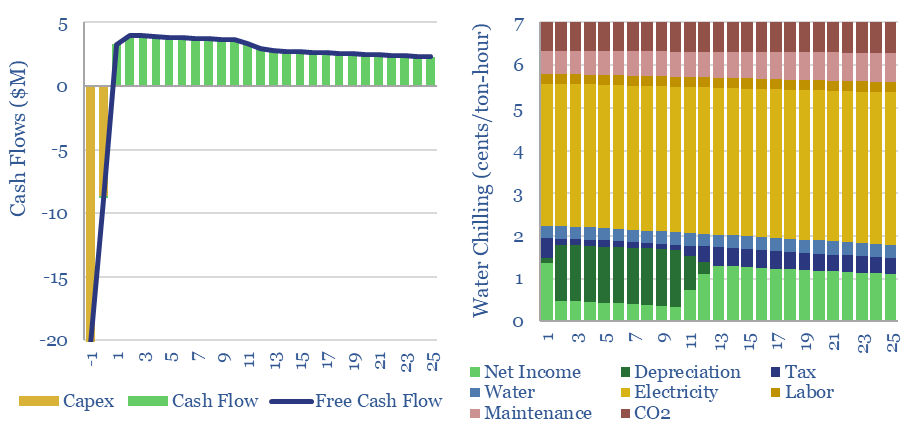
This data-file captures the costs of industrial cooling, especially liquid cooling using commercial HVAC equipment, across heat-exchangers, cooling tower evaporators and chillers. Our base case is that removing 100MW-th of heat has capex costs of $1,000/ton, equivalent to c$300/kW-th, expending 0.12 kWh-e of electricity per kWh-th, with a total cost of 7 c/ton-hour.
-
Geothermal energy: costs and economics?
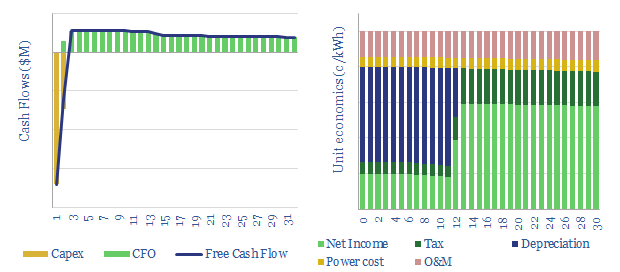
Geothermal energy costs are modelled from first principles in this data-file. LCOEs of 6c/kWh are available in geothermal hotspots. Outside of the hotspots, enhanced geothermal heat can cost 2-14c/kWh-th for a 10% IRR on $500-5,000/kW-th capex, while a rule of thumb is that geothermal electricity costs 5x geothermal heat.
-
AirJoule: Metal Organic Framework HVAC breakthrough?
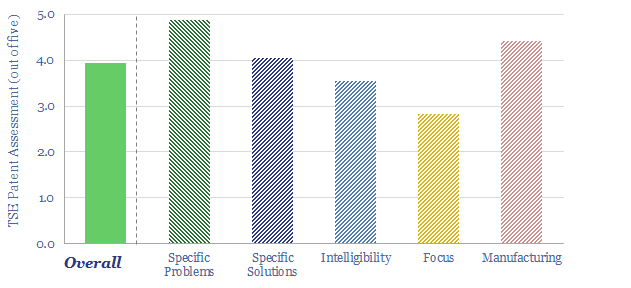
Montana Technologies is developing AirJoule, an HVAC technology that uses metal organic frameworks, to lower the energy costs of air conditioning by 50-75%. The company is going public via SPAC and targeting first revenues in 2024. Our AirJoule technology review finds strong rationale, technical details and challenges.
-
Power generation: sensitivity to high-temperature heatwaves?
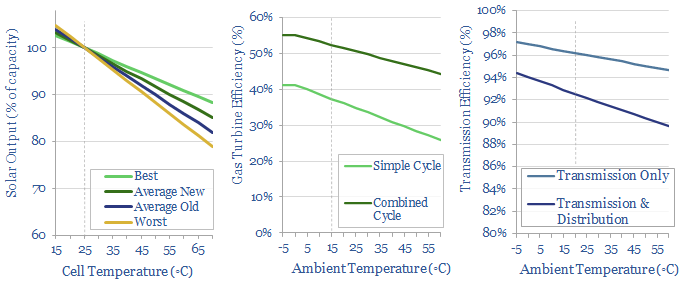
This data-file aims to provide a simple model for how generally well-covered grids can fail catastrophically during a heatwave. We have drawn on technical papers to quantify the deterioration of solar, gas, transmission and distribution losses, wind and other generation sources at higher temperatures.
Content by Category
- Batteries (89)
- Biofuels (44)
- Carbon Intensity (49)
- CCS (63)
- CO2 Removals (9)
- Coal (38)
- Company Diligence (95)
- Data Models (840)
- Decarbonization (160)
- Demand (110)
- Digital (60)
- Downstream (44)
- Economic Model (205)
- Energy Efficiency (75)
- Hydrogen (63)
- Industry Data (279)
- LNG (48)
- Materials (82)
- Metals (80)
- Midstream (43)
- Natural Gas (149)
- Nature (76)
- Nuclear (23)
- Oil (164)
- Patents (38)
- Plastics (44)
- Power Grids (131)
- Renewables (149)
- Screen (117)
- Semiconductors (32)
- Shale (51)
- Solar (68)
- Supply-Demand (45)
- Vehicles (90)
- Wind (44)
- Written Research (356)